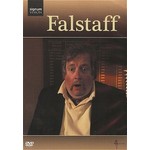
Falstaff (complete opera recorded in 2006 in a new version by Tony Britten)
 $52.00
Out of Stock
$52.00
Out of Stock6+ weeks add to cart
VERDI / BOITO
Falstaff (complete opera recorded in 2006 in a new version by Tony Britten)
Music Theatre London / Ian Jervis / Jan Hartley / Julia Forsyth / Simon Butteriss / Rosamund Shelley
[ Signum Vision / DVD ]
Release Date: Friday 1 August 2008
This item is currently out of stock. It may take 6 or more weeks to obtain from when you place your order as this is a specialist product.
 Suitable for General Audiences
Suitable for General Audiences
G; - "The DVD was recorded on location in and around a real golf club and the club acts as the setting for most of the scenes barring a few in the Fords' home." (MusicWeb Oct 2008)
"Tony Britten and his Music Theatre London company came to the prominence in the 1990s with a series of adaptations of the Mozart/Da Ponte operas. These were mounted at the Drill Hall in London. Britten re-wrote the text into witty English, replaced the recitative by spoken dialogue, re-scored the works for a small ensemble and used actors instead of opera singers. The results, evidently, were witty and hugely enjoyable.
On this DVD, Britten has produced a film of his 2005 version of Verdi's Falstaff. The mixture is pretty much as before except that there is no spoken dialogue apart from a few muttered asides over the music.
Britten has updated the work to the modern day. The Inn has become a golf club in Windsor with Falstaff - referred to ironically as Sir John - an habitué at the bar with his taxi-driver friends, Bardolph and Pistol. From the first, Britten and his designer have caught exactly the look of a sit-com or ITV comedy drama. Though whether it is illuminating to turn Falstaff into a sitcom, I am really not sure.
The DVD was recorded on location in and around a real golf club and the club acts as the setting for most of the scenes barring a few in the Fords' home. Ford has a big modern house and when he is Mr Brook he becomes a pseudo Mafioso, Signor Fontana. Britten gives the characters extensive back-story so that Falstaff is a 'resting' actor with only one TV series to his credit.
Though recorded on location, it has luckily been dubbed in the studio. I say luckily, because Verdi's vocal writing rather taxes the actors and the studio presumably enabled them to give of their best. The draw-back is that the piece does not sound as it looks; the sound-stage remains constant throughout the various locations and does not come across as a sit-com. Also the dubbing is imperfect and there are times when the actors just do not look as if they are singing.
Singing Verdi, even when with a reduced accompaniment is completely different from singing an aria or a song. This is especially true of Falstaff where Verdi effectively eschews the aria, using continuous dialogue and quite a lot of ensemble work. It is here that the production really comes unstuck. In the solo moments and the dialogues the actors bring enough wit and liveliness into the music that you can (almost) forgive them the sketchy details and shaky notes. Even so, the ensembles do not seem to work. This is especially true as the high lines cause problems for the sopranos in the ensemble.
All the actors work hard. Ian Jervis is a suitably sleazy Falstaff, but is somehow reduced by this version. Rather than shedding new light on the piece, Britten has managed to shrink big John into something smaller and more weasel-like. Daniel Gillingwater, Simon Masterton Smith and Simon Butteriss are good enough as Bardolph, Pistol and Doctor Cajus, but they are pretty much stock sit-com figures. The most rounded, sympathetic figures are the Alice Ford and Meg Page of Jan Hartley and Rosamund Shelly. Marilyn Cutts also gives a strong performance as Mistress Quickly. Nanetta Ford is neatly played by Katie Lovell, with the character rather more knowing than Verdi/Boito/Shakespeare's original. It was Lovell, I think, who had the most problems with the tessitura of Nanetta's part. Andy Morton's Fenton looked too mature, and rather crooned Fenton's music. But he certainly showed a great deal of flesh. Britten seemed to have a fascination with bath scenes. Fenton and Nanetta have one and Falstaff imagines a similar one for himself and Alice Ford.
Julian Forsyth is suitably stupid as Francis Ford, here turned into a QC. But his stupidity seems to make him a stock figure of fun and we never quite feel the sympathy for him that we do in Verdi's original.
The ending just about works, with a bit of a stretch. There is no chorus of children but the characters all wear crazy costumes and Ian Jervis bravely wanders around wearing nothing but antlers and a pair of novelty Rudolph the Reindeer underpants. The dénouement, when it comes, is diminished like the characters. As these are not real people, their reactions do not really matter so that Falstaff's bringing everyone together and the final chorus seem but mummery. And I certainly never want to hear the final chorus of the opera sung like that again.
Jonathan Gill directs his ensemble of players well and the reduction of Verdi's score only serves to illustrate what a miracle the original is.
If you enjoyed the original Music Theatre productions then you might enjoy this. But performing in a musical is vastly different from singing Verdi. Despite a lot of hard work neither Britten nor his cast quite convince us that replacing singers with actors is a good idea - much is lost and not a lot is gained."
(MusicWeb Oct 2008)

